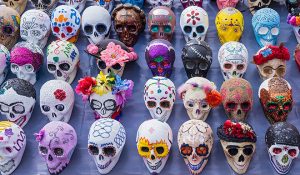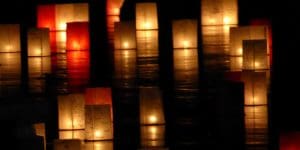 The Medieval History Behind Our Halloween Fascination With Skeletons
The Medieval History Behind Our Halloween Fascination With Skeletons
“As such powerful markers of death, the medieval bones could also be made into more fantastical things.”
In ancient times, people were in the dark about a lot of things. How many bones are in the human body, for instance. They understood basics, like bones being structurally necessary, and their count wasn’t too far off, but they had a lot to learn. Just like we do today, they studied bones for scientific and medical reasons and honored them for emotional and cultural reasons. Read more in this article from Time.
Found in: MasterFile Complete
The Celtic origins of Halloween transcend fear
“The holiday gives us the chance to look at our fears and fantasies, to dress up like them, and realize they aren't so scary after all.”
Interesting article about Samhain, the ancient Celtic New Year, which is the origin of our Halloween. It was an ancient Celtic festival with its own traditions and thoughts about darkness and fear.
Found in: General OneFile
El Obon y el Dia de Muertos: oportunidades para la diplomacia cultural mexicana
(The Obon Festival and the Day of the Dead: Opportunities for the Mexican Cultural Diplomacy)
“La cultura de México y Japón puede parecer distante y diversa, pero aún en la lejanía existen prácticas o creencias que las acercan debido a sus similitudes, tal creencia y a la vez práctica es la celebración del día de los muertos en ambos países que es festejado para honrar a los antepasados; en el caso de México, se celebra el 2 de noviembre cada año y en Japón el Obon o Bon es festejado cada verano del 13 al 16 de julio o agosto, dependiendo de la zona y del calendario.”
DeepL translation: “The culture of Mexico and Japan may seem distant and diverse, but even in the distance there are practices or beliefs that bring them closer due to their similarities, such belief and at the same time practice is the celebration of the Day of the Dead in both countries that is celebrated to honor the ancestors; in
the case of Mexico, it is celebrated on November 2 every year and in Japan the Obon or Bon is celebrated every summer from July 13 to 16 or August, depending on the area and the calendar.”
I’m going to make a guess here and say you didn’t know that our E-Library tools have articles in Spanish. Well, they do! This article is from Revista Confines, an journal from Mexico. My own personal interest in Japan (Japanese was my undergraduate major) prompted me to pick this article to share. To me, both Obon and El Día de Muertos is much more interesting and moving than Halloween, which feels commercial and gimmicky to me.
Found in: Gale Academic OneFile
 Want to explore more?
Want to explore more?
Our E-Library is a collection of online resources you can use anytime for free with your library card. To help you see the kinds of information you can access in the E-Library, we offer just a taste of what you can find in the E-Library in these 3 articles, selected from our online resources.
Don’t have a card yet?
Get a library card online. Once you have one, the E-Library is here for you, 24x7x365.




